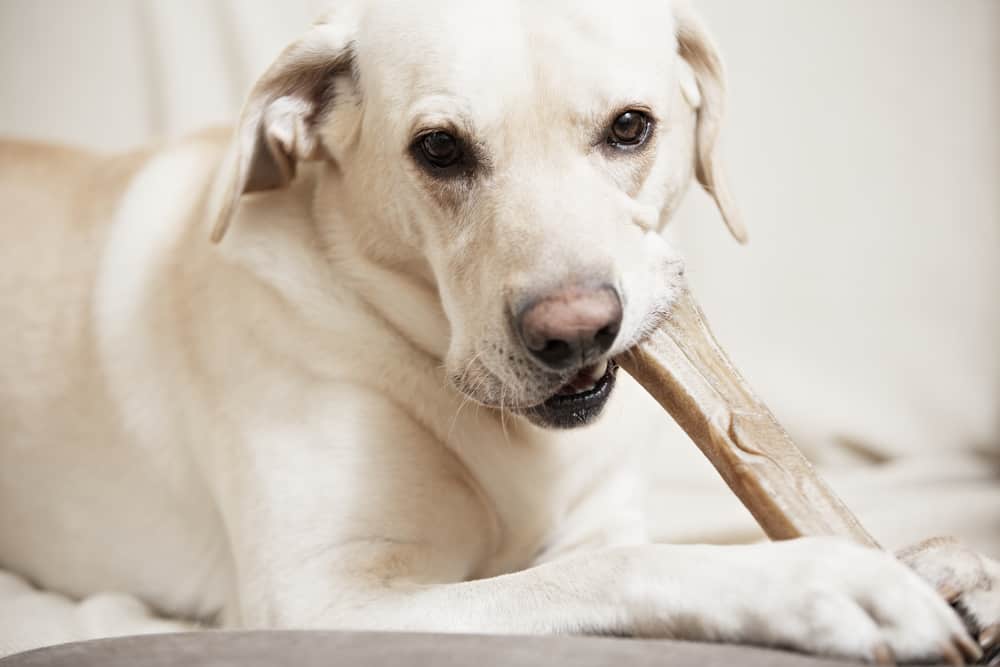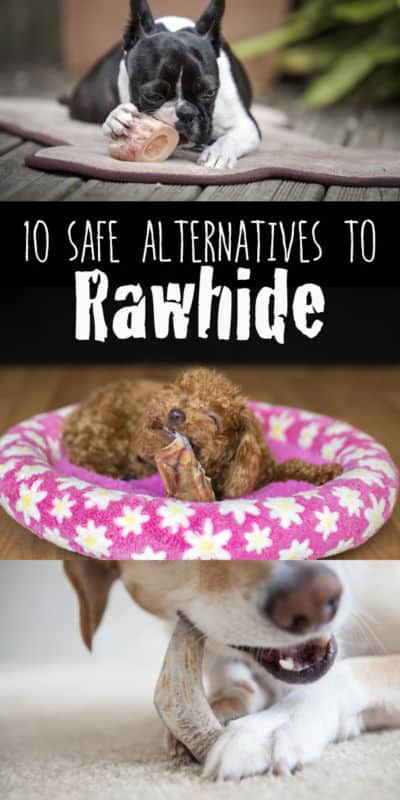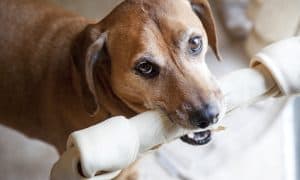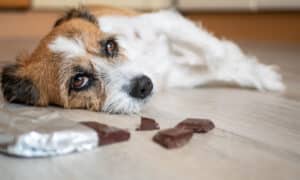“This post contains affiliate links, and I will be compensated if you make a purchase after clicking on my links.”
Chewing is not only fun for your dog, it’s essential to tooth and gum health and provides both physical and mental exercise. However, while rawhide remains one of the most popular options for chews, these treats can be dangerous, even life-threatening, to your dog.

Unless you’ve not had internet access for years, you probably understand how dangerous rawhide is to your dogs. Rawhide is made of the inner hide of a cow or other animal after it has undergone chemical processing to remove flesh and hair. Once the rawhide is made, it’s used whole or often ground into tiny bits to create a dog chew.
Sadly, most rawhide chews are not easily digestible and since dogs often swallow them, ingested rawhide can sit in their bellies for months and cause everything from digestive upset to intestinal blockages – which can often be fatal. There is also the ever-present danger of choking. And, the chemicals used to leach the material from the rawhide can cause further problems for your dog.
Still, the fact is, our dogs have been chewing on bones for thousands of years and it’s important that they continue to chew to keep their teeth and gums healthy. It’s also great for their mental health since chewing is a big part of a dog’s natural behavior.
Here are our top ten (safe) alternatives to rawhide:
1. Frozen Marrow Bones: These bones can generally be found commercially or are often available from your local butcher or grocery store. The marrow bones are any of the larger bones found in animals, such as the femur or hip bones. Best of all, they are filled with nutritious marrow. Beware though, don’t give your dog more than a couple per month and take it away if they begin to splinter or break. Marrow has an extremely high fat concentration and can cause stomach upset if given too frequently.
2. Hooves: Horse, cattle and pig hooves are some of the more popular chews for pets. The unique texture and shape helps support dental health by cleaning teeth and massaging gums. Choose a hoof that contains no chemicals or preservatives and, with any chew treat, monitor your dog while chewing. Be sure to choose a hoof that is too large to be considered a choking hazard and take the chew away from your dog when it’s been chewed to a size that can be swallowed.
3. Yak’s Milk Chews: Himalayan dog chews are fantastic options for any type of pet and they’re nutritious as well! The Nepali use an ancient recipe to make this popular hard yak’s milk cheese. These all-natural chews are available in a vast selection of sizes and are soft enough that you never have to worry about your dog breaking a tooth or swallowing whole. They are also completely digestible and easy on any dog’s tummy.
4. Edible Dental Chews: There are dozens of varieties of dental chews available, and it’s important to research which ones are right for your dog. These chews are generally 100% digestible with the added benefit of cleaning teeth and gums. Popular varieties of dental chews are made from potato starch – a gluten-free source of energy for your dogs. Their unique properties make them very easy to form into a variety of shapes and sizes so there is something available for any type of dog. Be sure that you buy the size appropriate for your dogs and follow package instructions.
5. Antlers: Antlers are naturally shed from elk or deer and they are super tough alternatives to rawhide. However, it’s important to choose a size appropriate for your dog. Since antlers rarely splinter, the most avid chewers may find it’s possible to break a tooth. Make sure your dog is handling the antler well and not chewing too aggressively.
6. Trachea Chews: Trachea chews, sometimes called “moo tubes” are a hollow, long-lasting chew made from the trachea of cow or lamb. As an added bonus, trachea chews are naturally high in glucosamine and chondroitin, two key ingredients to healthy joints! These chews are highly palatable, healthy for your pets, and are a completely digestible alternative to traditional rawhide.
7. Fish Skin Sticks: While they are arguably the strongest smelling of all chews, fish skin sticks, like Honest Kitchen’s Beams are also one of the healthiest for your dogs. These chews are made from the skins of wild-caught Icelandic catfish that have been dried into chewy sticks. Your dog will absolutely love them (although this may be a treat best given outdoors!).
8. Bully Sticks: These are dried bull pizzles (the inner tendon of the penis). Bully sticks are highly digestible chews and most dogs go crazy for them! However, there are a few downsides, including a very strong odor and a high caloric content. When buying bully sticks, it’s important to stick with those made in the USA or in South America due to more stringent preparation code. Those from India or China are often involved in recalls and considered unsafe by most professionals.
9. Tails: Tail bones are another long-lasting chew option for your pets. The higher quality beef tails come from Paraguay or the USA, while other forms of protein (like lamb) tend to come from New Zealand. Be sure you know the source when selecting any chews for pets.
10. Ears: Beef, lamb, and pig ears also happen to make delicious chews for dogs! Keep in mind that these are natural products, so there is often a distinctive odor that goes along with natural chews. However, they are great for your pets, long-lasting, and a safer choice than rawhide.
Bottom line, rawhide is a vet bill waiting to happen. Instead of risking your dog’s health and life, choose one of these healthy alternatives and leave the rawhide on the store shelves.
Do you have another favorite (and safe!) alternative to rawhide? Please, tell us about it in a comment below!
Pin this post!























Mary Susan Anders
says:You never mention chicken skin as an alternative.
April Williams
says:I never ever, ever give raw hide..I love my animals to much and don’t have that money to spend on a vet bill. I have 2 dogs 1 adult and 1 puppy, who we have to make sure she has things to always chew, she is a blue heeler. I make sure I do my research. I did not plan on getting a blue heeler, but when we decided to add an addition to the family, the Human Society in my town had just rescued 180 dogs and puppies from 2 back yard breeders/puppymill so we adopted a puppy that came from the rescue. We are happy about our decision, but it is alot of research but a lot of fun, she is active but very trainable and heelers are fast learners, her 2nd week with us all potty trained, she loves her crate and loves her training sessions. We devote a lot of time to her for she is only 3 mos old. With 3 animals 1 cat who has renal kidney failure, we can not be irresponsible in anything that would cost us a vet visit.
AdeleInTexas
says:How many pig ears have to be recalled before people stop buying them and how many dogs have to injure themselves on sharp hooves?
It’s a good note about the antlers. If your dog is enjoying it too much, it may actually cause problems to their teeth. They can essentially grind the tooth down to the nerve. Youch! Antlers are great, just not for every dog.
My dog is a difficult personality, and when things get tough, I give her a Dingo Dental Stick, she will take it to her bed and be quiet and calm. I am always hesitant about the products I offer my dog. I try to provide good dog food and natural treats. The size is ideal for my female husky, who cannot handle larger rawhides. My dog enjoys and expects one after dinner.
Very informative about why rawhides are bad for my dog, thank you! Also, my dog loves Bully Sticks, so thank you for the advice on buying only from the Americas.
It’s hard to determine which rawhide is good or bad for the dog. The best solution is doing some test. If your dog feels not good and shows some weird symptoms after doing that activity, you might need to stop that. I mean watch for any signs of bacterial contamination like vomiting, diarrhoea or any unusual thing happen with your dog. For whatever reason it is, you can pay more for a high-quality product and some companies even discuss their manufacturing process for the quality control aspect. Your dog and for sure you know better.
ADP
says:Rawide is poison period! No need to look for symptoms as it can be too late by the time you see them. The chemical process is nothing that any animal should ingest, please look for videos on line. Also they can get stuck in digestive track and either give your dog a long painful death or a long painful vet bill for the owner.
Sad to see that so many pet stores still sell them.